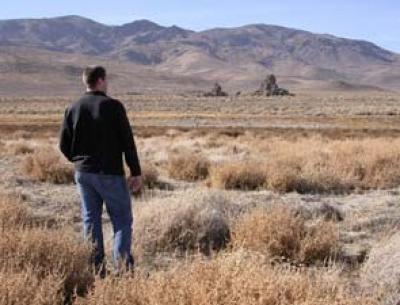Termites, fungi and climate change

UCF biologist Joshua King is an expert on termites and ants. Credit: UCF
For a long time scientists have believed that temperature is the dominant factor in determining the rate of wood decomposition worldwide. Decomposition matters because the speed at which woody material are broken down strongly influences the retention of carbon in forest ecosystems and can help to offset the loss of carbon to the atmosphere from other sources. That makes the decomposition rate a key factor in detecting potential changes to the climate.
But scientists from Yale, the University of Central Florida and SUNY Buffalo State found that fungi and termites, which help break down wood, may play a more significant role in the rate of decomposition than temperature alone.
The group's findings appear in this week's edition of the journal Nature Climate Change.
“The big surprise of this work was the realization that the impact of organisms surpassed climate as a control of decomposition across spatial scales,” said Joshua King, a biologist at UCF and co-author of the paper. “Understanding the ecology and biology of fungi and termites is a key to understanding how the rate of decomposition will vary from place to place.”
So how did scientists originally come up with temperature as the main factor in decomposition? It has to do with data and math. Scientists most often construct a model based on the average decomposition rates of sites that are in close proximity to each other.
In this case, it appears that each local number matter because they reflect the activity of fungi and termites. The team suggests that scientists need to embrace the variability found across data collected from many different sites instead of averaging it all together to create better models with more accurate predictions.
The team reached this conclusion after running a 13-month experiment. They distributed 160 blocks of pine tree wood across five sub-regions of temperate forest in the eastern U.S. — from Connecticut to northern Florida — and then monitored the decay that occurred.
They selected similar forest types, hardwood deciduous forests, to focus on major differences in climate across the regional gradient. (The average annual temperature in southern New England is about 11 degrees Celsius cooler than Florida.) Within each of the five sub-regions they placed the wood blocks in different types of terrain to evaluate the effects of local versus regional factors as controls on decomposition.
“Most people would try to make sure everything was as standard as possible,” said Mark A. Bradford, an assistant professor of terrestrial ecosystem ecology at the Yale School of Forestry & Environmental Studies (F&ES) and lead author of the study. “We said, 'Well, let's generate as much variation as possible.' So we put some blocks on south-facing slopes, where they would be warmer in the summer, and others on north-facing slopes where it's colder. We put some on top of ridges and others next to streams where it was wetter.”
After 13 months, they measured how much wood had been lost, whether to the consumption of fungi growing on the wood or to termites consuming the wood.
According to their analysis, local-scale factors explained about three quarters of the variation in wood decomposition, while climate explained only about one quarter, contrary to the expectation that climate should be the predominant control.
“We're reaching the wrong conclusion about the major controls on decomposition because of the way we've traditionally collected and looked at our data,” Bradford said. “That in turn will weaken the effectiveness of climate prediction.”
The team's recommendation: collect more data at local sites and improve our understanding of how local conditions affect the organisms that drive decomposition, because they could significantly improve the effectiveness of climate change projections.
Co-authors of the study include: Robert J. Warren II from SUNY Buffalo State; Petr Baldrian from the Academy of Sciences of the Czech Republic; Thomas W. Crowther, Daniel S. Maynard and Emily E. Oldfield from Yale; William R. Wieder, from the National Center for Atmospheric Research in Boulder, CO and Stephen A. Wood from Columbia University.
The National Science Foundation and Yale Climate & Energy Institute funded the research.
King is an assistant professor of biology at UCF. He has multiple degrees including a Ph.D in entomology from the University of Florida, a master's degree in education from Tufts University and a bachelor's degree in biology from Tufts. He is an expert on termites and ants and his work is currently funded by the National Science Foundation to study the ecology of ants in Florida and the southern US.
Media Contact
All latest news from the category: Studies and Analyses
innovations-report maintains a wealth of in-depth studies and analyses from a variety of subject areas including business and finance, medicine and pharmacology, ecology and the environment, energy, communications and media, transportation, work, family and leisure.
Newest articles

Shaping the Future: DNA Nanorobots That Can Modify Synthetic Cells
Scientists at the University of Stuttgart have succeeded in controlling the structure and function of biological membranes with the help of “DNA origami”. The system they developed may facilitate the…

At What Cost? Smoking Linked to Decreased Earnings, Less-Educated Workers
A new paper in Nicotine & Tobacco Research, published by Oxford University Press, finds that smoking has a negative effect on earnings among younger workers. This is particularly true among the…

Tackling Life-Threatening Fungal Infections Using RNA Modifications
Importance of RNA modifications for the development of resistance in fungi raises hope for more effective treatment of fungal infections. An often-overlooked mechanism of gene regulation may be involved in…



